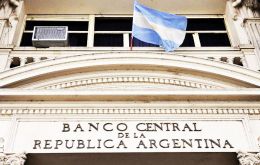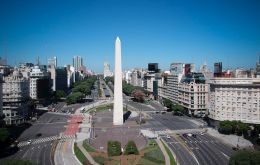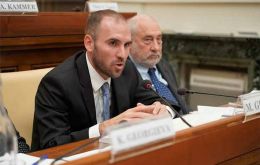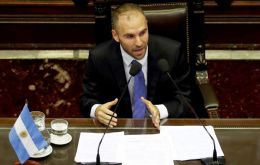MercoPress. South Atlantic News Agency
Tag: Argentine economy
-
Monday, July 18th 2022 - 09:05 UTC
Somber future ahead for Argentina's economy

Foreign Analysts do not see a bright future ahead for Argentina's economy. While some place it among the countries most likely to default its debt, others fear it might not survive a new adjustment to the basic interest rates by the United States.
-
Saturday, July 31st 2021 - 09:32 UTC
“Only a miracle can save Argentina's economy,” says Brazilian President Bolsonaro

Brazilian President Jair Bolsonaro has said in his social media broadcast that “only a miracle will save the Argentine economy,” as he referred to the administration of his colleague Alberto Fernández as “a regime that did not work anywhere in the world.”
-
Friday, August 14th 2020 - 09:38 UTC
Argentina inflation in July was 1,9% and the 12-month rate 42,4%

Argentina's July inflation rate was 1.9%, the government's Indec statistics agency reported on Thursday, bringing the seven-month rate to 15,8% and the 12-month rate to 42.4%. During July the items which showed the main increase were Housing maintenance, 3,9% and Leisure and Culture, 3,3%, with a special emphasis in electronics and home appliances.
-
Tuesday, June 9th 2020 - 08:14 UTC
Argentina's economy could contract 9,5% in 2020, according to central bank poll

Argentina’s economy is seen shrinking 9.5% in 2020, according to a monthly poll of analysts by the central bank released on Friday, compared with an estimated 7% decline in the previous survey, as the activity gets walloped by a nationwide lockdown against the coronavirus pandemic.
-
Monday, April 27th 2020 - 07:59 UTC
Mercosur: Argentina only interested in block's negotiations with Europe

In the midst of the chaotic situation caused by the pandemic, the Argentine government announced the abandonment of Mercosur negotiations to prioritize the country’s domestic economy and the struggle against the virus. The rest of the bloc members must evaluate legal, institutional, and operational measures emerging from the decision.
-
Thursday, March 26th 2020 - 08:45 UTC
Argentine economy contracted 2,2% last year and could drop another 2% in 2020

Argentina's GDP contracted 2.2% last year, hit by the downfall of manufacturing, retail and financial activities, according to the official stats office, Indec. In the last quarter of 2019 the economy dropped 1% over the previous quarter and 1.1% compared to the fourth quarter of 2018.
-
Thursday, March 26th 2020 - 08:27 UTC
Argentina's “Children and youth protection project” receives US$ 300 million from World Bank

The World Bank Board of Directors approved a new US$ 300 million operation to support Argentina’s efforts to strengthen its social protection system and minimize the impact of the crisis on the most vulnerable families.
-
Tuesday, March 3rd 2020 - 08:30 UTC
Argentina hires Lazard, Bank of America and HSBC for debt restructuring process

Argentina’s government said on Sunday it had hired Lazard as financial advisor and Bank of America and HSBC as debt placement agents for the debt restructuring process it hopes to close by the end of March.
-
Tuesday, February 18th 2020 - 06:32 UTC
FT: “Argentina needs a plan for investment-led growth”

The Financial Times dedicated on Monday an editorial to Argentina and its current strategy to avoid again defaulting by pressing on the IMF, and later on sovereign bondholders, for a significant haircut in its national debt approaching 90% of GDP. However, FT points out that “debt talks are unlikely to succeed without a strategy for economic revival”
-
Friday, February 14th 2020 - 08:28 UTC
Argentina anticipates rough times for bondholders in any of three possible economic scenarios

Argentina’s economy minister confirmed bondholders’ worst fears, telling them to brace for significant losses as the country restructures its debt amid an economic crisis. Martin Guzman warned that holders of Argentine debt will probably be disappointed by the restructuring, without providing specifics on how steep losses could be.
